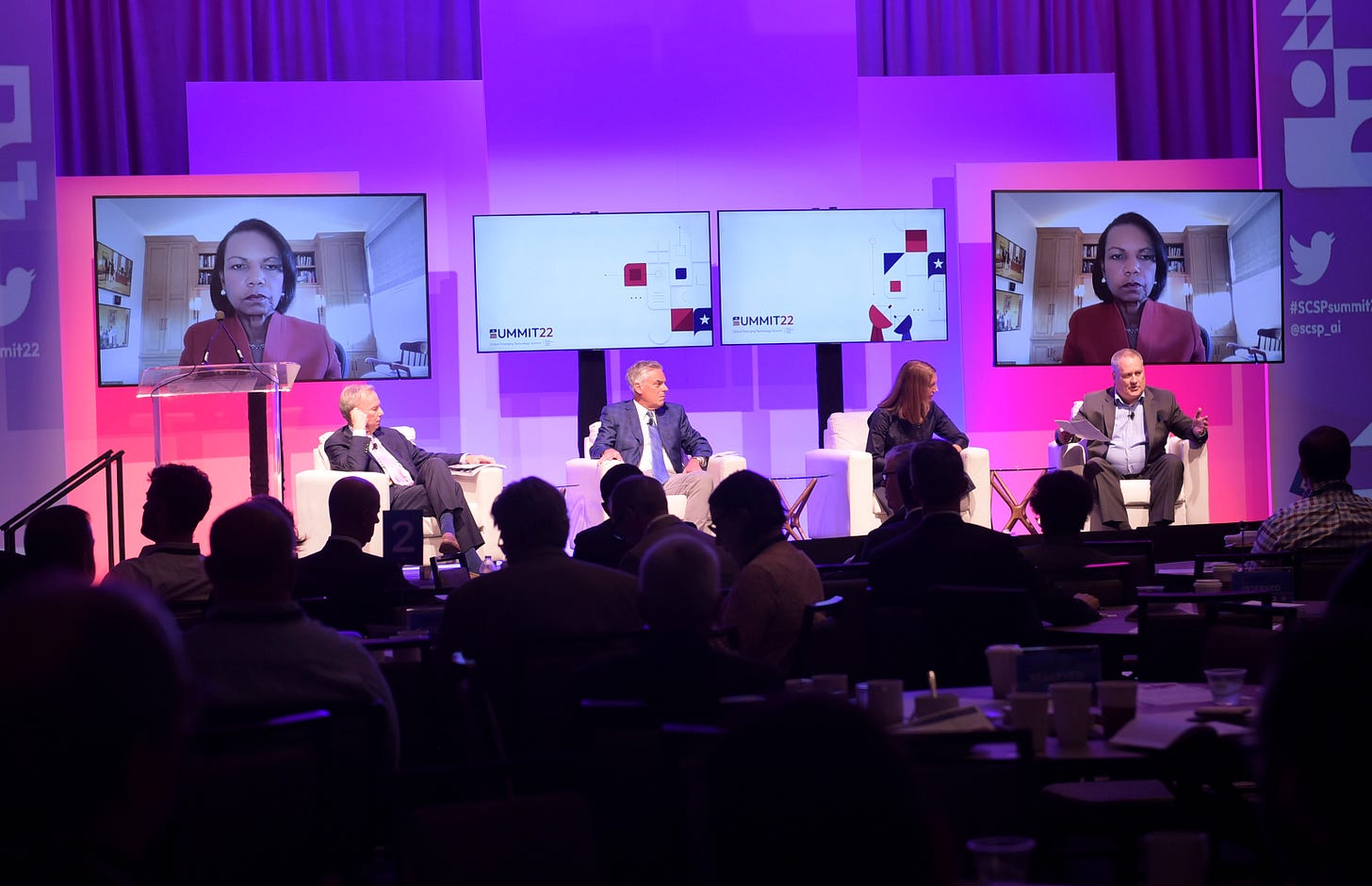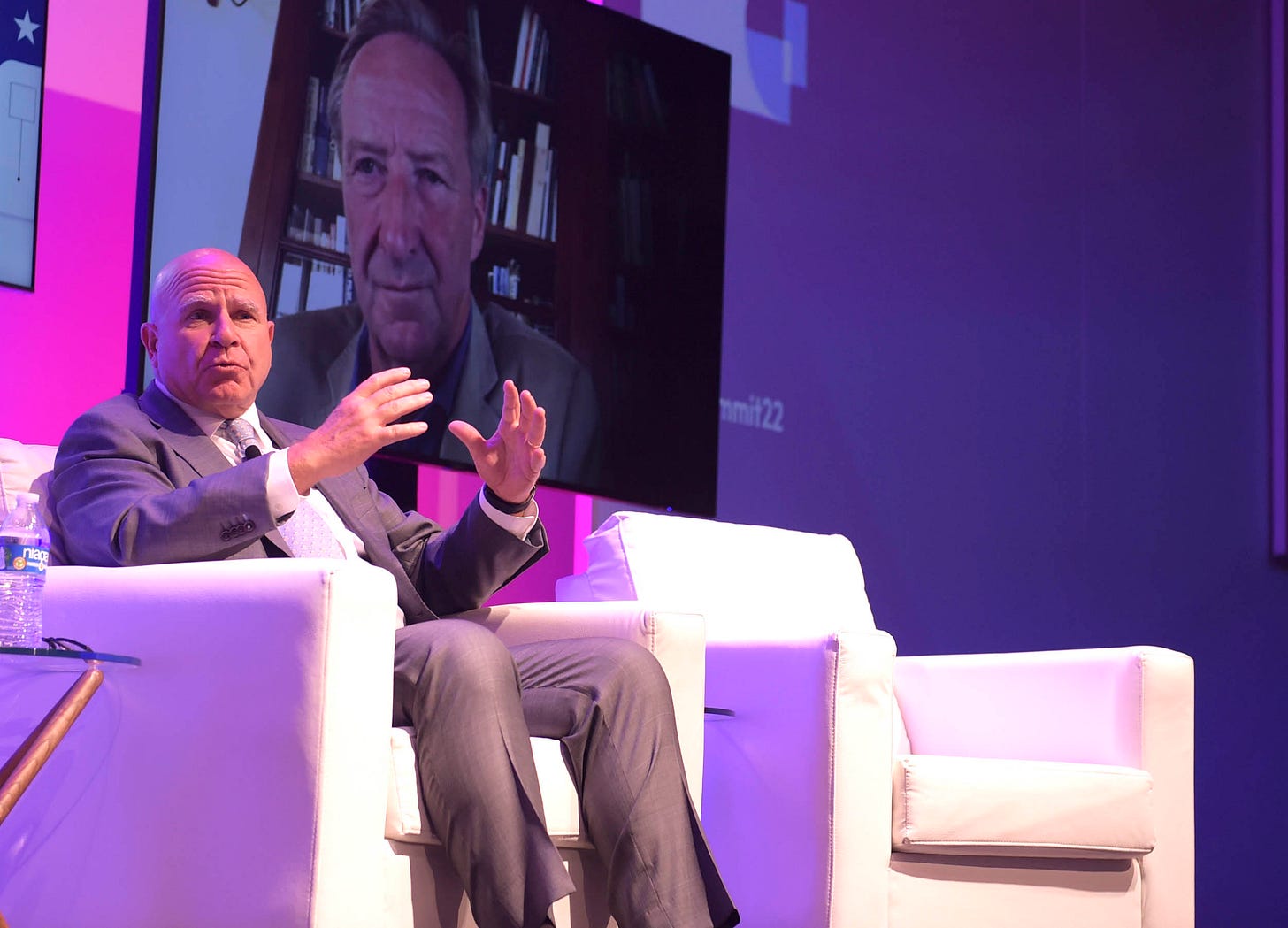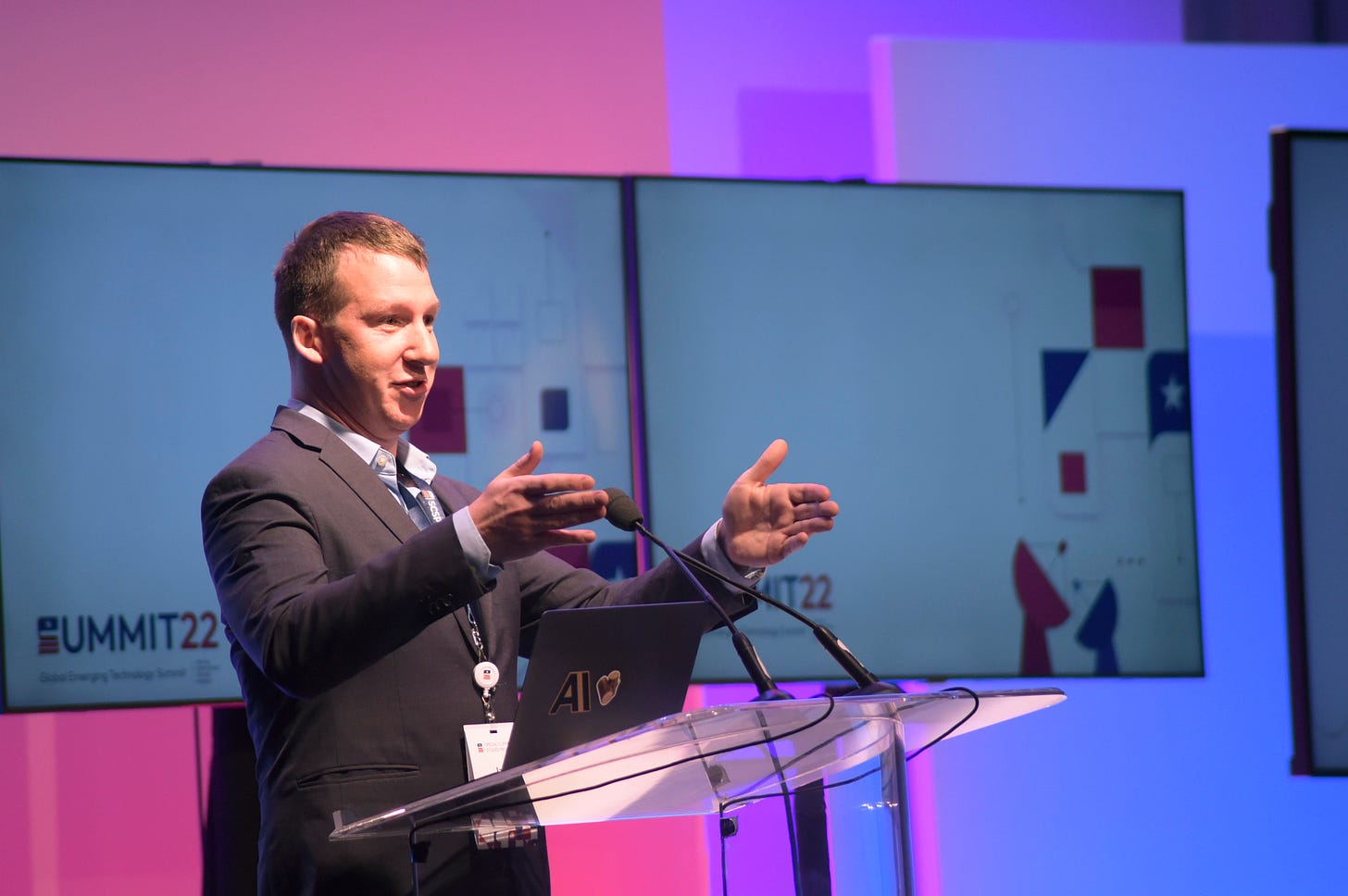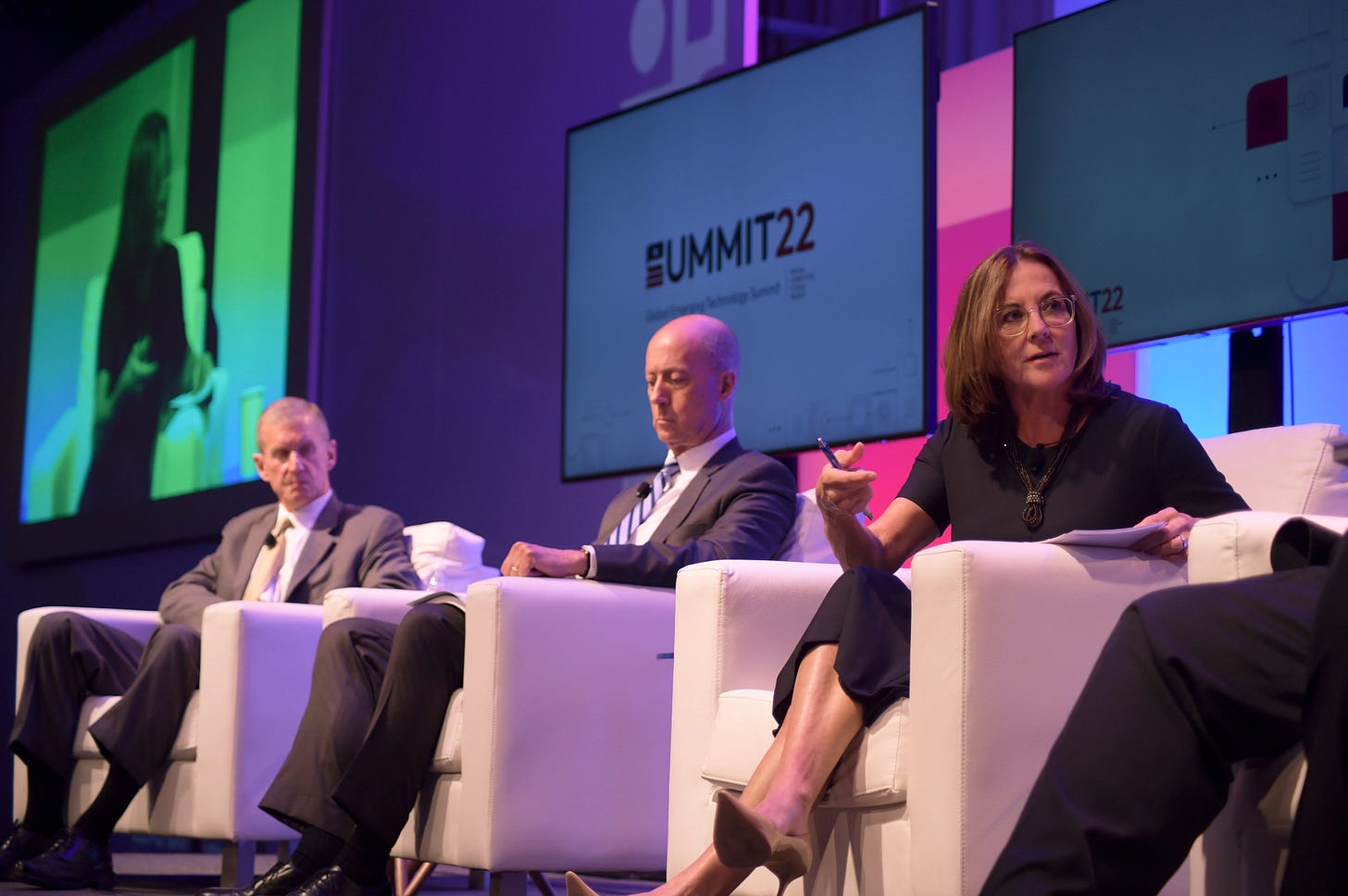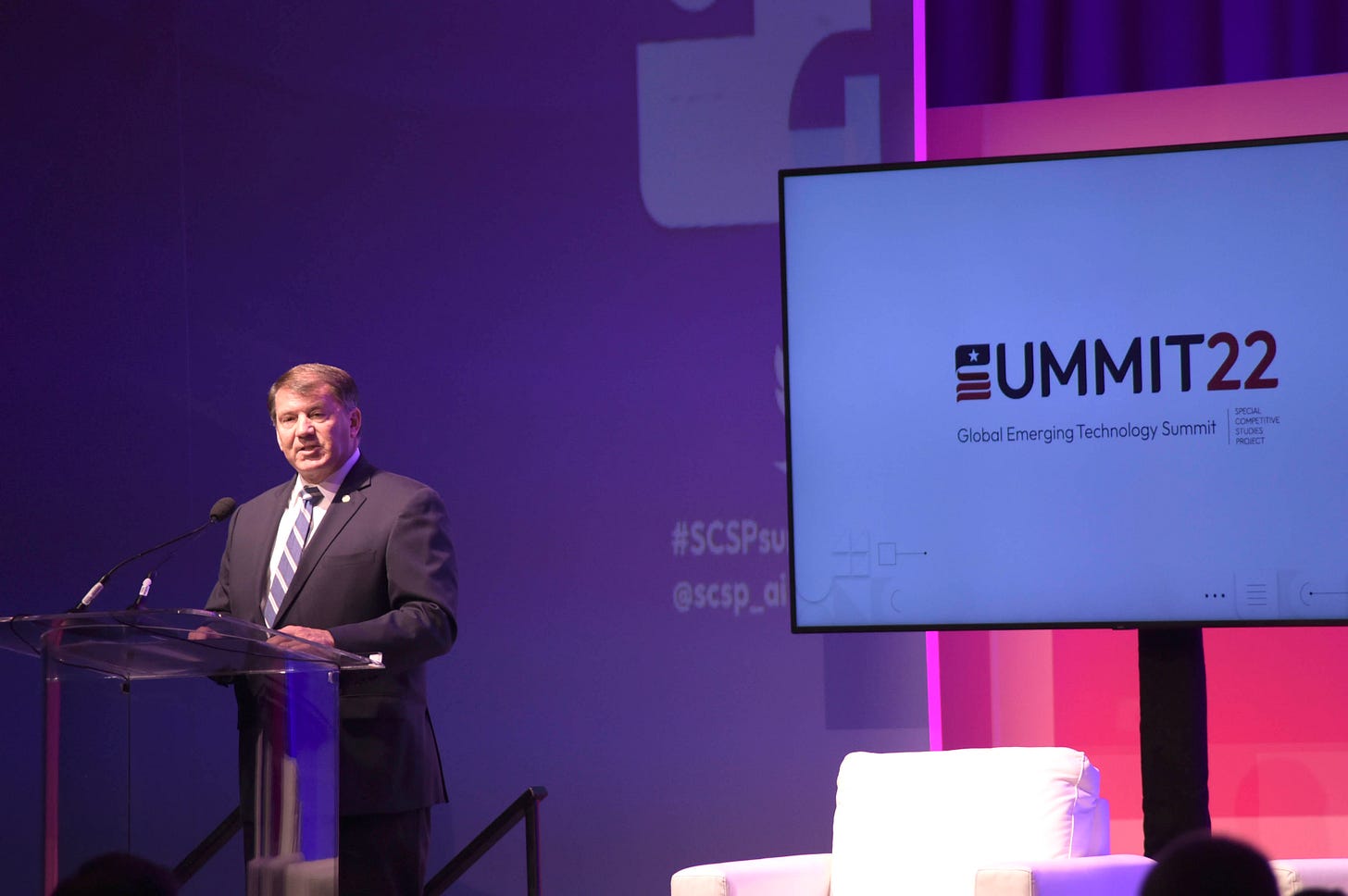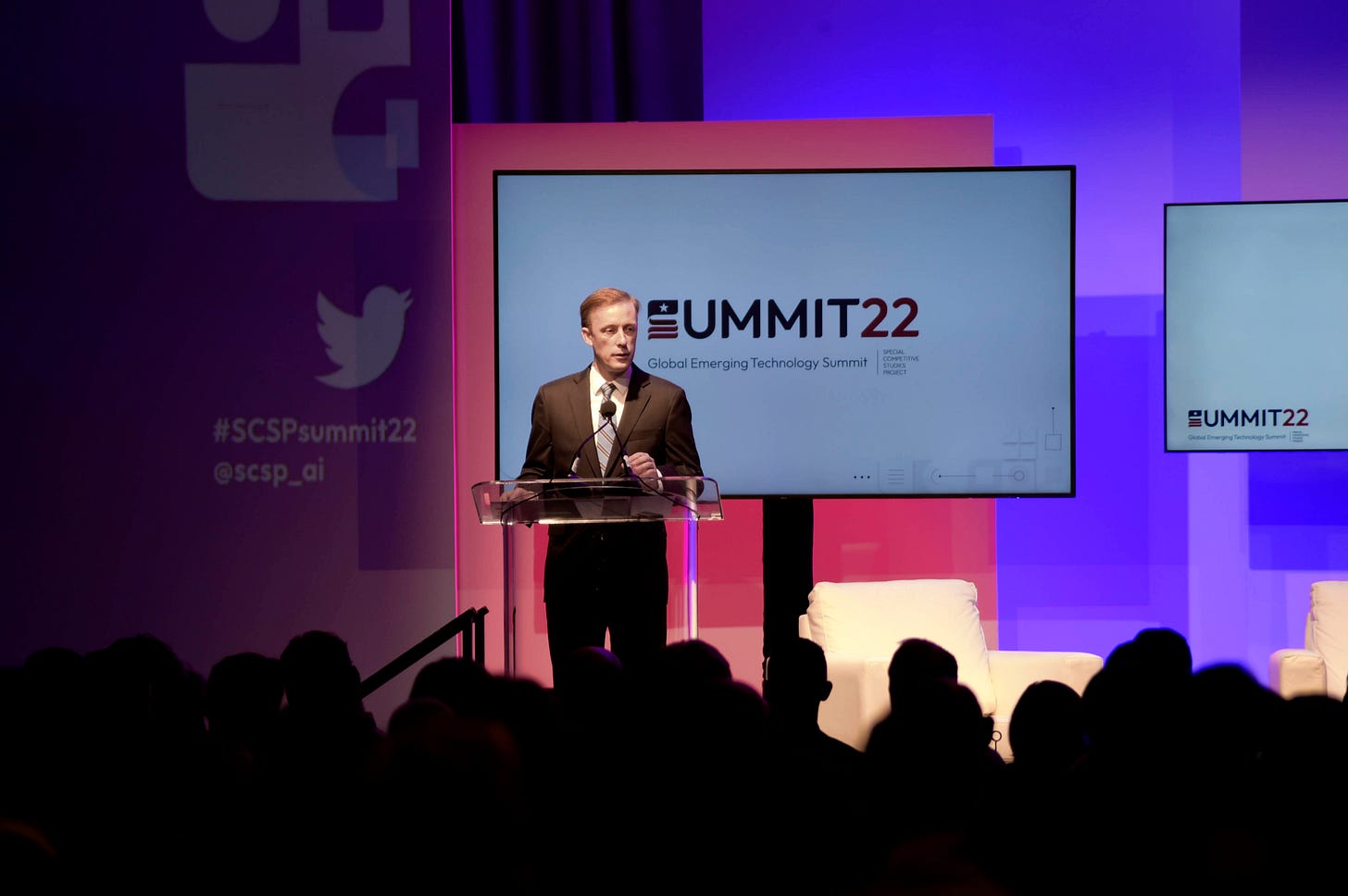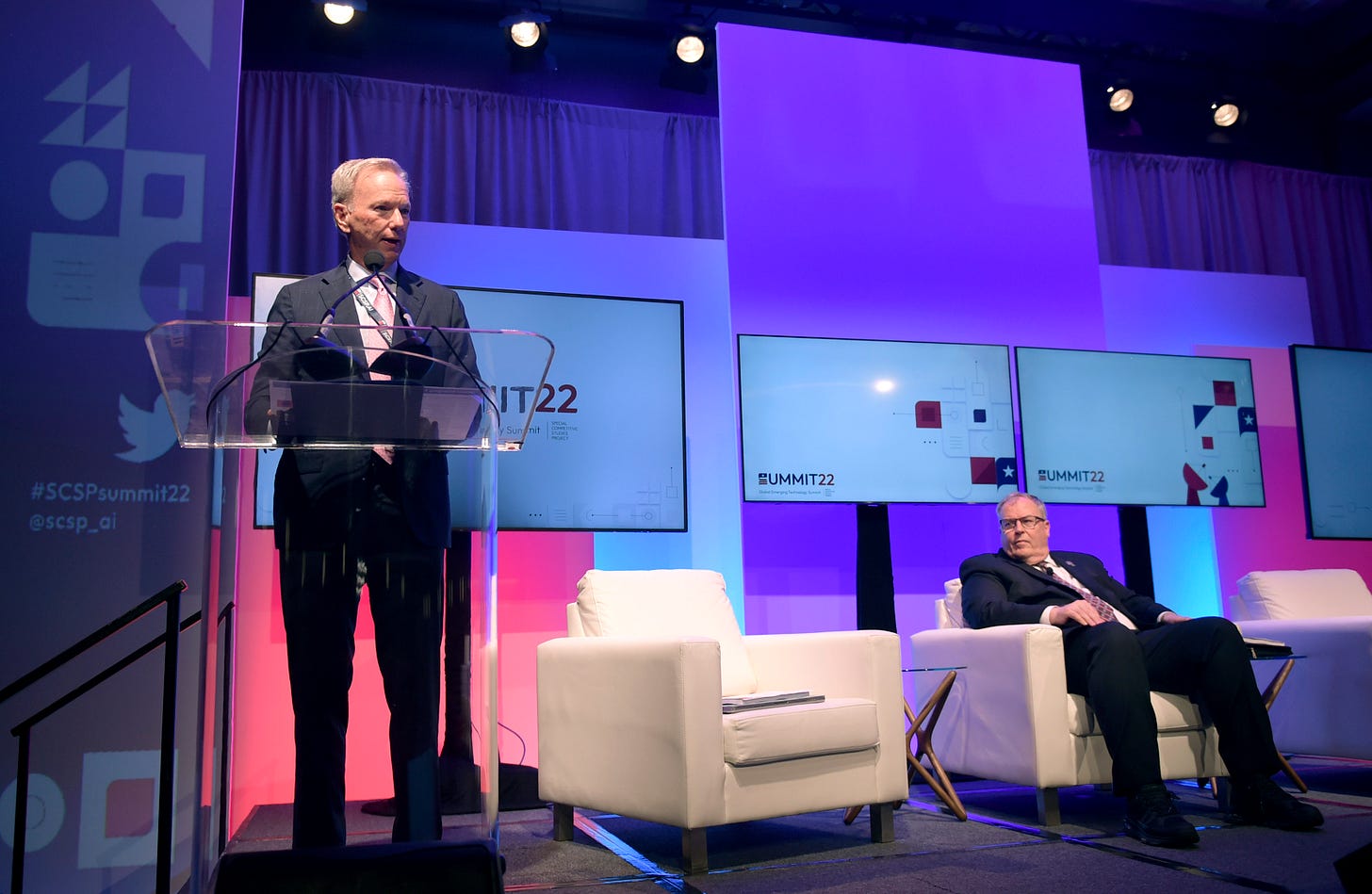Global Emerging Technology Summit 2022
Summary of the highlights from SCSP's Global Emerging Technology Summit
Hello, I’m Ylli Bajraktari, President and CEO of the Special Competitive Studies Project (SCSP). Welcome to the 2-2-2. The 2-2-2 brings you monthly analysis on topics at the intersection of technology and national security. This edition will share highlights from our Global Emerging Technology Summit that brought together leading innovators, entrepreneurs, and policymakers.
The Special Competitive Studies Project (SCSP) was created in October 2021 to develop a non-partisan agenda that can help Americans recapture the confidence to face today’s challenges with a shared sense of national purpose.
The Project grew from the congressionally-mandated National Security Commission on Artificial Intelligence (NSCAI). NSCAI succeeded foremost in informing the U.S. Government, Congress, and Americans about the multifaceted implications of AI and associated technologies for national security. SCSP expands this writ from AI to emerging technologies to beyond national security-focused issues.
A Model from the Past. We found a nearly perfect model for the level of ambition befitting our challenges in a 1950s era Cold War study led by Henry Kissinger called the Rockefeller Special Studies Project. It marshaled expertise from across American society to bring coherence and direction to a national agenda at the beginning of a new era. The group – drawn from industry, academia, and government – believed America needed a new strategy to deal with new problems.
Mid-Decade Challenges to National Competitiveness:
In case you missed it, SCSP’s first report, Mid-Decade Challenges to National Competitiveness, is available now. This report establishes why the United States should care about China and other authoritarian countries securing an advantage in emerging technologies and what can be done to win the technology competition.
Highlights from the Global Emerging Technology Summit:
Two weeks ago, SCSP hosted its Global Emerging Technology Summit. It was a great success thanks to the participants and the hundreds of individuals and organizations who partnered with SCSP over the past year. More than five hundred people were in the audience and more than one thousand more watched online as some of the world’s leading statesmen, technologists, and thinkers gathered to discuss how to position the United States and fellow democracies to win the tech competition.
The Summit was a powerful platform for driving a bipartisan national security tech agenda. U.S. National Security Advisor Jake Sullivan outlined the Biden Administration’s technology strategy. The Principal Deputy Director of National Intelligence, Deputy Secretary of State, and Deputy Secretary of Defense each discussed their organization’s technology agendas. Key members of Congress from both sides of the aisle outlined their legislative priorities and accomplishments. Allies and partners from Ukraine, Israel, the EU, NATO, Taiwan, and the Republic of Korea shared their vision and initiatives. Three former U.S. national security advisors spoke about the implications of technology and geopolitical trends for the future of strategy.
The keynote of the Summit was the fireside chat between our CEO Ylli Bajraktari and former Secretary of State Henry Kissinger who ran the Rockefeller Special Studies Project. As executive director, Dr. Kissinger was asked to define the major problems and opportunities that the United States confronted as it shifted from the aftermath of World War II and faced an ideological competitor striving for nuclear parity. Rather than recommend practical solutions to the problems of the day, Dr. Kissinger was tasked by Nelson Rockefeller to “tell him what is right and what the future would look like.” Dr. Kissinger welcomed it and stressed the importance of SCSP’s work given the challenges facing America today.
SCSP’s partners in the private sector, including CEOs from biotechnology, AI, fusion, and computing hardware companies, and VCs highlighted exciting trends and affirmed that U.S. companies are making huge strides and remain the world’s innovation leaders. And we received two remarkable tech demos about the possibilities and limits of AI today.
We are honored and humbled that so many people share SCSP’s convictions about the state of the technology competition and our determination to develop a winning strategy. As our Chairman Eric Schmidt said, ”we have a national, bipartisan priority to win in establishing technology platforms for the globe that we invent, that we drive.”
For those of you who were unable to join us, you can view all of the panels here. Here are the big takeaways:
1. Democracies are resilient and their future is brighter than we think.
On the frontlines of the contest with authoritarian regimes, Ukraine is exemplifying the resilience and power of a democracy and free people. Mykhailo Fedorov, Vice Prime Minister and Minister of Digital Transformation of Ukraine, opened SCSP’s Summit, capturing the stakes and the urgency of the authoritarian threat and explaining how the Ukrainian people, a democratic government, are out-innovating a larger foe. He reminded the audience that Ukraine is fighting for all democracies, and this fight can only be won if they come together.
Former Secretary of State Condoleezza Rice is optimistic about the future of democracy because, paraphrasing Winston Churchill, “we don’t have anything better.” Democracy is not without its challenges, but it is the far superior form of government as compared to tyranny. “Show me an authoritarian regime,” she said, “and I will show you one that is fearful of its people and its people are afraid of it. That is not a great environment for creativity and progress, even in a place like China.” If asked, the average citizen would rather have “basic freedoms…to say what they believe, to worship how they please.” The challenge, Dr. Schmidt said, “is the ability to automate misinformation.” Democracies need to find ways to deal with misinformation and understand how it changes the body politic. Ambassador Huntsman added that anywhere he went in the world, no one stopped him to say that they were yearning for a Chinese or Russian platform or system. He credits that to a yearning for American freedoms.
As democracies struggle with the impact of disruptive technologies including the proliferation of misinformation, Sylvia Burwell, President of American University, sees hope on campus, and the campus as a microcosm of the society at large. “I’m an optimist [because] I am at a university everyday, and [I] see the antidotes [to these challenges] in action.” President Burwell challenged the audience to apply the three rules American University presents to its incoming students each fall: “get your facts, take it off social, and get it in a room.” Working through hard societal issues with those keys in mind helps individuals and the community find common ground, even at one of the most politically active universities in America.
2. Geopolitics: The situation is dangerous, but our rivals are on the defensive.
The strategic competition with China is serious and unlike any past experience. Secretary Rice cautioned that “[Looking at] the race with China on the technological side, we better get our act together because this time, we have a determined and much more effective and capable adversary on the technological front.” Democracies should mobilize, but must not overreact. Sir Alex Younger, the former Chief of the British Secret Intelligence Service (MI6), noted that “we seem to be lurching from complacency to panic.” Justin Bassi, Executive Director of the Australian Strategic Policy Institute, agreed that democracies should not panic, but insisted that “governments should be shocked into action.”
The strength of China and Russia should not be overstated on the battlefield, at the negotiating table, or as emblematic of an authoritarian future. Former National Security Advisor, General H.R. McMaster explained that the Russian military’s parade performance exceeds its actual prowess, showing once again that, “authoritarian regimes put on a good show…but are brittle.” To compete, democratic governments will need to engage all sectors of their society. “We should be confident…coming out of this conference to work together with our friends and allies and…across to the public and private sectors.”
The emerging partnership between China and Russia represents an opportunity for the United States to exploit. The strategy the United States pursued during the Cold War of trying to drive a wedge between China and Russia is no longer feasible. The United States should emphasize their public pronouncement of a friendship with “no limits.” Now is the time to “tape them together,” General McMaster exhorted, “and to hang their authoritarian behavior, the reinvasion of Ukraine on February 24, and the brutality since then around their necks like a lodestone.”
3. The tech future is here.
The future of technology is shifting and the next wave of innovation will stitch together the physical, digital, and biotechnical realms. Rapid progress is being made today in AI, biotechnology, and energy generation; between now and 2030, the United States must act to lead the platforms of the future. As Dr. Reshma Shetty of Gingko Bioworks explained, the “front runners in a platform set the precedents, and each design decision on a platform embeds the values of that society.” CEO of Samaya AI Maithra Raghu identified the rise of deep neural networks base methods. Recently, she said, progress has been made unifying “the types of AI systems that could be built.”
Jack Clark, co-founder of Anthropic, demonstrated at the Summit how large language models (LLMs) have advanced to the point that they could easily be mistaken for human agents. He stressed that “these systems have potential policy implications” as they gain adoption in real world applications. He stressed that there is a long-term risk of giving “these [sorts of] things more a sense of consciousness than they have, but I wouldn’t bet against these sorts of things developing a really sophisticated sense of reasoning over the next few years.” In that same vein, AI advancements in the last decade have also led to the “rise of deep neural networks base methods,” said CEO of Samaya AI Maithra Raghu. Recently, she said, progress has been made unifying “the types of AI systems that could be built.” Endowing your AI system with prior knowledge from a variety of systems will enable it to learn a “huge number of very rich concepts about the world.”
Dr. Bob Mumgaard, CEO of Commonwealth Fusion Systems, explained how fusion energy generation — a star's essense of power on earth — is finally within reach in the next decade. U.S. leadership in this field could unleash the next energy revolution.
The founder and CEO of Groq, Jonathan Ross, did caution that the struggle for technological advancements is about exclusion and resources. The U.S. economy does not want to find itself excluded from the resources to keep it on the cutting edge of technology. As the United States’ economy becomes more reliant on chips that power AI, it is crucial that we not get excluded from the chip market.
4. Warfare and conflict are changing before our eyes.
Technology and geopolitics are driving rapid changes in warfare. Former Chair of the House Armed Services Committee Mac Thornberry argued that Americans think of war and peace as binary, and need to understand that the United States is in a state of persistent conflict with China, not just competition. Retired General Stanley McChrystal noted that technology has created unprecedented transparency at the tactical level, while former Deputy Secretary of Defense Robert Work observed that drones are becoming as important as artillery, and are already more persistent and more precise than traditional artillery.
Former Deputy National Security Advisor Nadia Schadlow argued that to win in this environment, the United States will need to produce cheap, attritable systems that our industrial base can support. Turning to the audience she said that the national security innovation base needs to expand to “all of you in this room.” We are all “stakeholders in this competition that we're facing whether or not you want to be…like investors, academic researchers, the labs of small small companies, innovative companies, entrepreneurs. The national security industrial base needs to extend beyond the traditional bounds.”
Sec. Work argued that democracies hold inherent advantages over authoritarian regimes, particularly when it comes to the future of conflict. A key idea in the Third Offset Strategy he developed at the Pentagon was the understanding that Third Offset strategy “young men and women grow up in a democratic society in which their input is valued and sought and are trained to exercise initiative without worrying about what their seniors might say.” The reason “they were going to be much better in a war in which AI and autonomy was ubiquitous was because authoritarian regimes generally did not expect their young men and women to exercise independent judgment and initiative.”
During the next budget cycle, the Department of Defense and Congress should use a technology-enabled, competitive strategy as its framework – what SCSP calls an Offset-X strategy. As the core of Offset-X, the U.S. military should fully embrace distributed, network-based operations. Incorporating human-machine collaboration and human-machine combat teaming can enable faster and superior decision-making, and enable the execution of complex and high-risk missions, while reducing risks to civilians. Software is now integral to every component of the decision tree and kill chain, and its importance will only continue to increase. The U.S. military should develop every future system, capability, and operation with a software-centric orientation in mind.
5. The tech competition agenda is rolling in the U.S. Government.
National Security Advisor Jake Sullivan was adamant that our nation cannot afford to lose its edge in science and technology. He outlined the Biden Administration’s strategy: the United States must recharge the engine of technology innovation, attract and retain STEM talent, protect our national technology advantage, and deepen cooperation with global partners. He concluded that “the government has to bring all hands on deck to craft, and deliver, the right competition agenda for emerging technologies.”
Connecting the domestic and international technology agendas, Deputy Secretary of State Wendy Sherman noted that we are at a crucial moment to invest in our industrial base, shape international technology standards so they respect human rights, and protect the integrity of the global technology ecosystem. She commented that “we have to work to make technology work for democracy, and not against it.” The State Department is making cyber and emerging technology issues of top priority and established a new bureau for cyberspace and digital policy. Deputy Secretary of Defense Kathleen Hicks outlined the Pentagon’s initiatives, including standing up the Chief Data and Artificial Intelligence Office (CDAO) and launching the AI and Data Acceleration (Ada) Initiative. In the Intelligence Community, as noted by Principal Deputy Director of National Intelligence Stacey Dixon, “innovation is a must-have,” and they are looking at areas such as space, cyberspace, and biotech where innovation from industry is booming, and the government needs to not only keep up with those changes, but also work to lead the way.
All speakers from the Legislative and Executive Branches lauded the recent bipartisan, legislative success of the CHIPS and Science Act as a vital first step to restore U.S. technology advantage by spurring research through the National Science Foundation, fueling discovery through national laboratories, supercharging production of semiconductors, and investing in the STEM workforce.
Speaker of the House Nancy Pelosi was clear in her message: “The CHIPS and Science Act is bringing manufacturing back to American shores, ensures that American laboratories remain the envy of the world, and is equipping America’s next generation of scientific pioneers. The Act is a monumental step forward but there is much more work to be done.”
Senate Majority Leader Chuck Schumer also noted congressional action and leadership with the CHIPS and Science Act: “It was a bipartisan effort from start to finish. At the end of the day, this isn't a fight for which country has the best technologies, this is a fight for which country’s values dominate and define the century.”
Members of Congress, including Senators Kirsten Gillibrand (D-NY) and Todd Young (R-IN), also voiced overwhelming, bipartisan alarm to the global technology competition. Senator Mike Rounds (R-SD) unequivocally captured that “it is not a fight for which country has the best technologies but a fight for which country’s values dominate and define the century.” Further, the Senator added, “The U.S. has the ability to be leaders in AI. It just needs to be done. Cutting edge technology is critical to the competition with China and it must be harnessed at home and abroad.” Winning the global technology competition is a fundamentally bipartisan issue, and America cannot afford to proceed otherwise.
This work has to include the private sector, and America’s allies and partners. As National Security Advisor Sullivan said, “we need the private sector to tell us what we are missing and if we are behind the curve on how to get us ahead. Our doors are open.”
6. Allies are innovating.
The alliance agenda is broad and deep. In Europe, the EU is also pushing to strengthen its techno-industrial base including by developing its own CHIPS Act. European Parliament Vice President Kaili insisted that “the EU cannot afford to compete with the U.S. in sectors where it will make a key difference” for the geopolitical competition, and rather that we need to drive joint investment in critical areas. André Loesekrug-Pietri, Chairman of the Joint Disruptive European Initiative, also warned that Europe is falling behind in technology. David van Weel, NATO’s Assistant Secretary General for Emerging Security Challenges, emphasized that “we need to outsmart opponents and that is how innovation wins wars,” and Dr. Appelbaum, Chief Scientist of Israel, added that allies must combine the best international talent in academia, government, and commercial technology to keep up with China. Working in that direction, NATO established the Defence Innovation Accelerator of the North Atlantic (DIANA), a form of DARPA for the Alliance, and the Defence Innovation Fund, a joint venture to fund DIANA, in order to better capitalize on the European and American private sector and bolster the North Atlantic innovation.
Israel’s National Security Advisor Eyal Hulata also pointed out how the nation has benefitted from a booming innovation ecosystem and technology sector. Emblematic of the breadth of the tech partnership agenda, Israel is working with the U.S. on a strategic partnership covering AI, quantum computing, pandemic preparedness, and climate. In the Indo-Pacific, Wu Tsung-Tsong, Minister of Science and Technology of Taiwan, stressed that “Taiwan is using its position and resources to become the world’s most trustworthy partner for international investment in emerging technologies.” “It is impossible today to achieve economic security without international cooperation,“ declared South Korea’s Vice-Minister for Science, Technology and Innovation, Joo Young-Chang. In a dangerous world, Allies don’t have any other choice than to work together on standards, complementary regulatory efforts, and joint investments in democratic innovation.
7. Urgency remains the watchword.
Dr. Schmidt concluded the Summit with a caution about the future: “We need to make sure that what happened to us in 5G cannot happen again. You do not want to operate on platforms that are controlled and produced by nations that don’t have the same values as you.” That means the United States should build on the momentum of recent achievements like the CHIPS and Science Act, and keep moving forward. The U.S. government has one budget cycle remaining to set the conditions for the second half of the decade. The defense of democracy in Europe is playing out right now. New technologies are transforming our world. The United States needs the organization, plans, partnerships, and resources to harness them.






